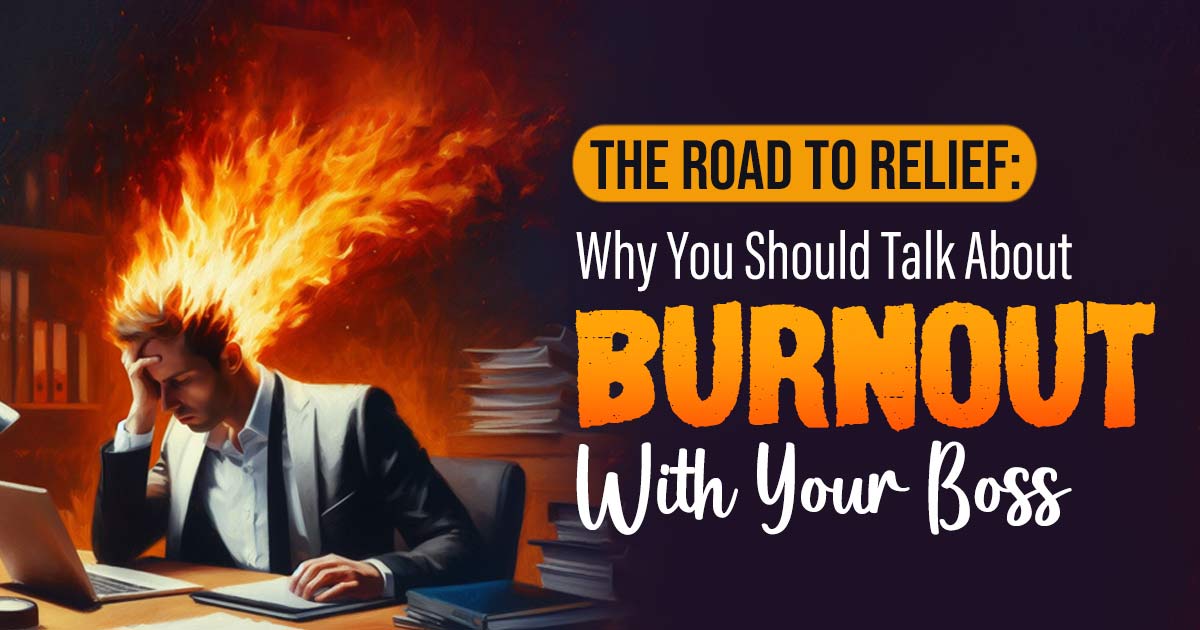In today’s fast-paced and demanding work environments, burnout has become an increasingly prevalent issue. It can affect anyone, from entry-level employees to top-level executives. Recognizing and addressing burnout is crucial not only for the well-being of employees but also for the success of the organization. One significant step in managing burnout is having an open and honest burnout conversation with your boss.
The Importance of Talking About Burnout with Your Boss
When addressing burnout, the initial crucial step is acknowledging its presence, signifying your commitment to both personal well-being and organizational success. An burnout conversation with your boss can serve as a proactive measure to prevent declining performance and productivity that could adversely affect your team and the company.
Furthermore, involving your boss in the conversation provides an opportunity to access valuable resources aimed at helping you effectively manage burnout. These resources may include HR support, employee assistance programs, or counseling services, all of which can contribute to finding solutions and mitigating the impact of burnout.
Importantly, tackling burnout in its early stages is essential to prevent its escalation, which can lead to more severe mental and physical health issues and prolonged absences from work. Addressing burnout promptly ensures a more manageable process for both you and the organization, reducing the potential negative consequences that can arise from unaddressed burnout.
How To Approach The Burnout Conversation With Your Boss
Selecting the appropriate time and setting for your conversation is crucial; it ensures that both you and your boss can engage in an uninterrupted and productive dialogue in a private, comfortable space that promotes open communication.
Prior to the discussion, thorough planning and preparation are essential. To effectively communicate your concerns about burnout, develop a clear understanding of the specific issues contributing to it, whether they pertain to your workload, deadlines, or interpersonal conflicts. Preparing a list of these concerns can serve as a valuable tool during the conversation.
In addition, when engaging in discussions about burnout, honesty and transparency play a pivotal role. It is essential to be candid about your feelings and experiences while maintaining a professional demeanor. Avoiding blame and focusing on collaborative solutions will help foster a constructive and supportive dialogue.
Handy Communication Strategies To Use In The Burnout Conversation With Your Boss
Consider the following effective communication strategies to use in the burnout conversation with your boss:
1. Use “I” Statements:
Frame your concerns using “I” statements, which emphasize your feelings and experiences rather than placing blame. For example, say, “I have been feeling overwhelmed with my workload” instead of “You have been giving me too much work.”
2. Focus On Impact:
Describe how burnout is impacting your work, your well-being, and the team’s success. Share specific examples of how your performance has been affected.
3. Offer Solutions:
While it’s important to share your problems, also come prepared with potential solutions or suggestions for improvement. This shows your commitment to resolving the issue constructively.
4. Active Listening:
Allow your boss to respond and ask questions. Listening to their perspective is equally important. This can lead to a more collaborative approach to addressing the burnout.
5. Set Realistic Expectations:
Discuss expectations moving forward. Be clear about what changes you need and how they align with your job responsibilities.
Overcoming Potential Challenges In Approaching Your Boss About Burnout
Challenges may arise during your conversation about burnout with your boss. One common challenge is the initial lack of understanding or acceptance regarding the extent of your burnout. In such situations, it can be helpful to provide concrete evidence, such as examples of missed deadlines or reduced productivity, to substantiate your claims and underscore the severity of the issue.
In some cases, you might encounter a lack of empathy or a dismissive response from your boss. In such circumstances, it is crucial to remain composed and persistent. Share your feelings and experiences, emphasizing the impact not only on your well-being but also on your work and the organization as a whole.
If the conversation with your boss fails to yield satisfactory results or if the issues persist, it may be prudent to seek higher support. Involving HR or higher management can provide you with additional resources and support to address burnout more effectively and ensure your concerns are appropriately addressed within the organization.
Follow-up And Accountability In The Burnout Conversation With Your Boss
After the initial burnout conversation with your boss, it’s crucial to follow up and track progress. Here are some steps to ensure accountability and effective resolution:
1. Set Goals:
Work with your boss to establish concrete goals for addressing burnout. These could include workload adjustments, better time management, or changes in project assignments.
2. Regular Check-Ins:
Schedule follow-up meetings to evaluate progress and discuss any ongoing concerns. This demonstrates your commitment to resolving the issue.
3. Self-Care:
Take responsibility for self-care and stress management. Implement the strategies discussed with your boss, and seek external support if necessary.Burnout is a pervasive issue in the modern workplace, and addressing it is vital for personal well-being and organizational success.
Having a burnout conversation with your boss is a proactive step that can lead to tangible improvements in your work life. Overcoming potential challenges and following up on agreed-upon solutions are essential steps in ensuring that the conversation leads to a more sustainable and fulfilling work experience.




























